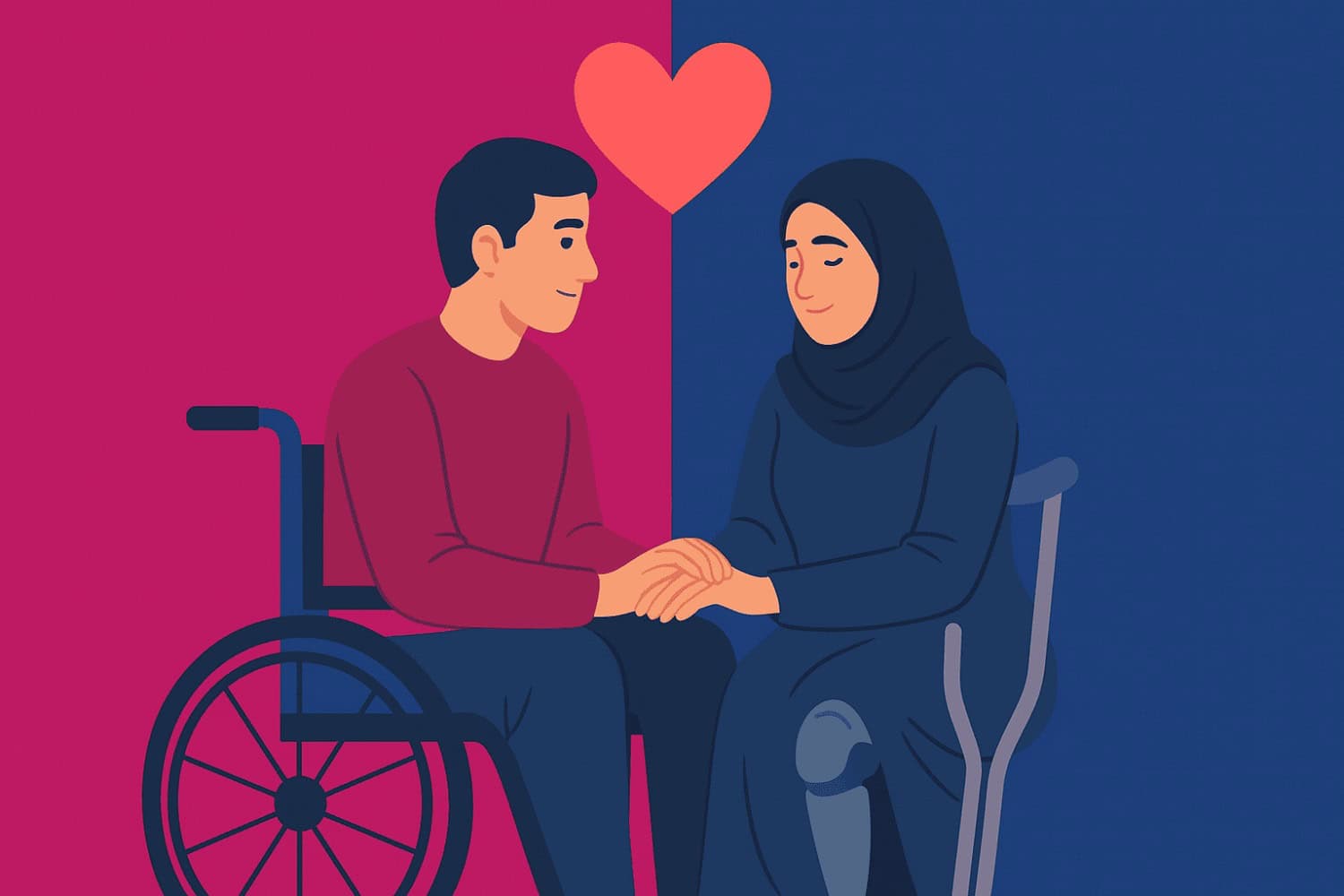
South24 Center powered by artificial intelligence
30-09-2025 at 9 AM Aden Time

“The psychological tendencies of many persons with disabilities are shaped by dominant societal perceptions, in which the disabled individual is frequently regarded as a burden.…”
Faheem Al-Qudsi ( South24 Center)
It has never been easy for many families in Yemen to accept the notion of one of their sons or daughters marrying a person with a disability. Such rejection often stems from fear or a patronizing perception that reduces the life of a disabled individual to mere incapacity and dependence—overlooking the fact that disability does not diminish one’s humanity, nor their inherent need for love, stability, and the right to form a family.
Yemeni legislation and international conventions—most notably the Convention on the Rights of Persons with Disabilities (CRPD)—explicitly guarantee this right. The CRPD affirms the equal legal capacity of persons with disabilities to make critical life decisions, including the right to marry. Yet social realities remain misaligned, as many individuals with disabilities continue to encounter severe barriers—ranging from societal rejection to inflated dowry demands and discriminatory practices, particularly in rural communities.
Despite these barriers, powerful human stories have emerged—defying constraints and demonstrating that love and determination can transcend even the most entrenched obstacles. This report sheds light on those silenced narratives and legitimate aspirations, situated between protective legal frameworks and a social reality still laden with challenges.
Legal Guarantees and the Right to Marry
The Yemeni Constitution affirms that all citizens are equal before the law, including persons with disabilities, who are entitled to the full right to marry and establish a family. This right is further reinforced by the international Convention on the Rights of Persons with Disabilities (CRPD), ratified by Yemen in 2008, which explicitly guarantees it across multiple provisions.
Article 12 of the Convention affirms that persons with disabilities possess legal capacity on an equal basis with others in all areas of life—including decisions related to marriage and family formation. Article 10 safeguards the right to life, while Article 16 ensures protection from exploitation and abuse.
Article 23 underscores respect for home and family, granting persons with disabilities full autonomy in choosing a partner and forming a family, with guarantees of support, empowerment, and protection against discrimination or denial.
Dr. Abdullah Ahmed Banyan, a disability rights advocate, told ‘South24’ that the legal and international provisions leave no room for doubt regarding the legitimacy of marriage for persons with disabilities. He stated:
“National laws and international conventions underscore the urgent need to challenge flawed societal perceptions surrounding marriage involving persons with disabilities, and to affirm their status as equal partners in building families and contributing to community life. Rejection or hesitation in this context often stems from ignorance or a patronizing mindset—rather than any legal or inherent limitation.”
Shaker Barahma, Director of the Fund for the Care and Rehabilitation of Persons with Disabilities in Shabwa Governorate, emphasizes that marriage is not only a legitimate right but also a fundamental life necessity for persons with disabilities—particularly for women, who often require greater support as they grow older.
He told South24: “The marriage of persons with disabilities must be actively supported and promoted by all sectors of society.”
Social and Psychological Barriers
Despite the clarity of legal provisions, social barriers remain the most formidable challenge facing persons with disabilities when contemplating marriage. Shaker Barahma describes these barriers as deeply entrenched in societal rejection of the concept—particularly in rural communities.
He told South24: “The most significant obstacles stem from society’s refusal to accept the marriage of persons with disabilities. In urban areas, recent years have seen growing acceptance—whether between persons with disabilities themselves or between them and non-disabled individuals.
However, the situation in rural regions remains far more difficult, especially for women, due to limited awareness and inadequate access to education.”
Compounding the issue are intertwined economic and social barriers—most notably inflated dowry demands and burdensome marriage requirements—that place persons with disabilities under intensified pressure. They often find themselves caught between limited financial empowerment on one side and society’s restrictive perceptions on the other.
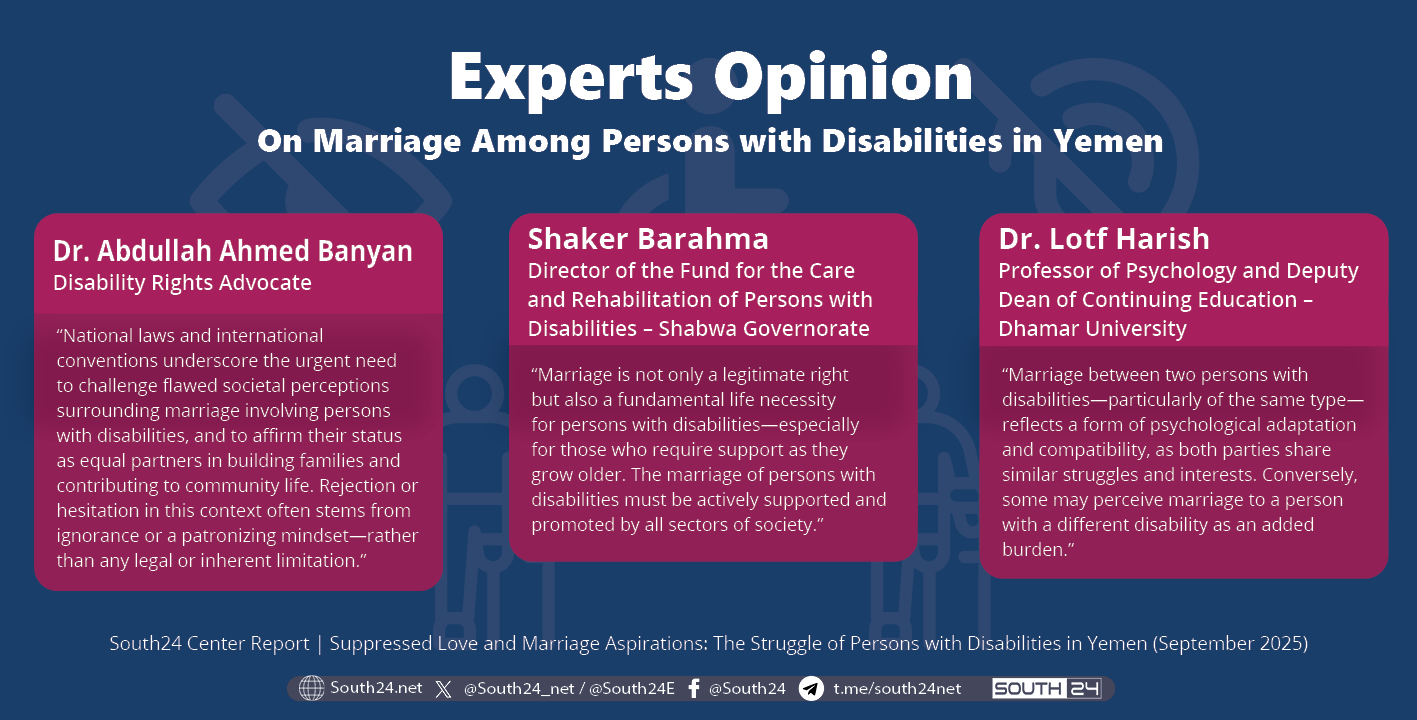
From a psychological standpoint, Dr. Lotf Harish, Professor of Psychology and Deputy Dean of Continuing Education at Dhamar University, observes that some persons with disabilities tend to seek relationships with partners who share the same type of disability, believing it fosters greater emotional harmony and mutual understanding.
He told South24: “Marriage between two persons with disabilities—particularly of the same type—reflects a form of psychological adaptation and compatibility, as both parties share similar struggles and interests. Conversely, some may perceive marriage to a person with a different disability as an added burden.”
Dr. Harish further explains that the psychological attitudes of many persons with disabilities are shaped by dominant societal perceptions, in which the disabled individual is often viewed as a burden—or even a curse. Such stigmatization reinforces feelings of isolation and leads many to prefer marrying within the disabled community to avoid rejection and humiliation.
Statistics remains one of the most glaring gaps, as there is still no accurate data on marriage or divorce rates among persons with disabilities in Yemen. Due to the absence of documentation and registration, this issue remains outside official monitoring, making it harder to formulate effective policies that respond to their needs.
Real-Life Experiences
From Divorce to Strength and Advocacy
Norhan Salem, a young woman from Aden Governorate, lived a normal life during which she completed her university studies at the Faculty of Law – Public Law Department. After getting married, while pregnant with her first child, she suffered severe complications due to an autoimmune disease that affected the veins in her leg, ultimately leading to the amputation of her right leg below the knee.
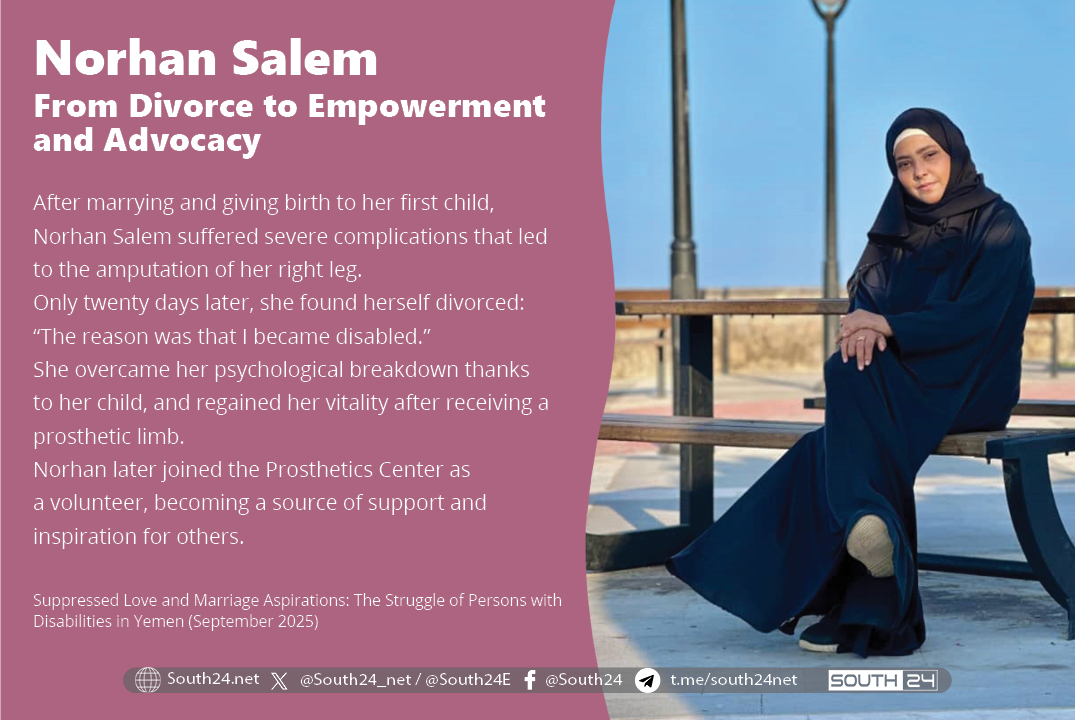
But what was more painful than the surgery itself was what followed: just twenty days later, she found herself divorced. Norhan says: “The reason was that I had become disabled.”
The divorce devastated her, especially since she had already lost both her parents and was now mother to an eight-month-old infant, and to top it all, was living in a house at risk of collapsing.
She described that phase to South24: “My mental state was completely shattered, but my child was the strongest motivation that made me cling to life. I would see him crying, wanting me to carry him, and I would rise leaning on my crutch, determined to be better for his sake.”
After receiving a prosthetic limb, Norhan regained part of her mobility and considered it the first step in her new life. She didn’t stop at personal recovery—she decided to become a source of support for others. She joined the prosthetics center as a volunteer, where she was warmly welcomed, marking the beginning of a new chapter of giving.
Today, Norhan has become a positive role model for men and women who have experienced both limb loss and marital breakdown. She works to support them psychologically and affirms that life does not end with amputation.
Disability Harmony and Role Integration
Mohammed Saleh Al-Zubairi (from Sanaa) is one of the most prominent examples that challenges the stereotypical image of marriage among persons with disabilities in Yemen. He is blind and leads the ‘Naseem’ musical band. Mohammed has built a rich and diverse family life: he first married a woman with a physical disability and had four children with her, then later married again, to Huda Ali Al-Abbasi—who is also blind and active in the field of disability rehabilitation.
Huda Al-Abbasi spoke to South24 about her experience:
“The family and societal perception of marriage among persons with disabilities remains uninformed, viewing them as incapable of bearing responsibility—especially disabled women, who are seen as unable to fulfill family duties. But our experience dispelled those fears and proved the opposite.”
Regarding their shared life, Huda added:
“Mohammed is my safety and my refuge. I found in him the kindness and affection I had always dreamed of. There is great understanding between us—we might call it disability harmony. What some may consider as a barrier actually brought us closer. I try to meet his daily and household needs, balancing my duties and studies. Thankfully, I’m top of my class academically, and I hope to be top in my marital life as well.”
Mohammed, for his part, affirms that the foundation of any successful marriage is love:
“Societal and familial views are built on flawed customs and traditions. But the truth is that love is the real bond that a person needs above all else—married life has no meaning without it.”
An Exceptional Marriage Defying Norms
From Ibb Governorate emerges the story of Adel Abadi, a man with a physical disability who raised the banner of hope and determination in the face of a society that did not easily accept his decision to marry. Adel chose his life partner from among women with physical disabilities, believing that true understanding stems from shared suffering and the ability to adapt.
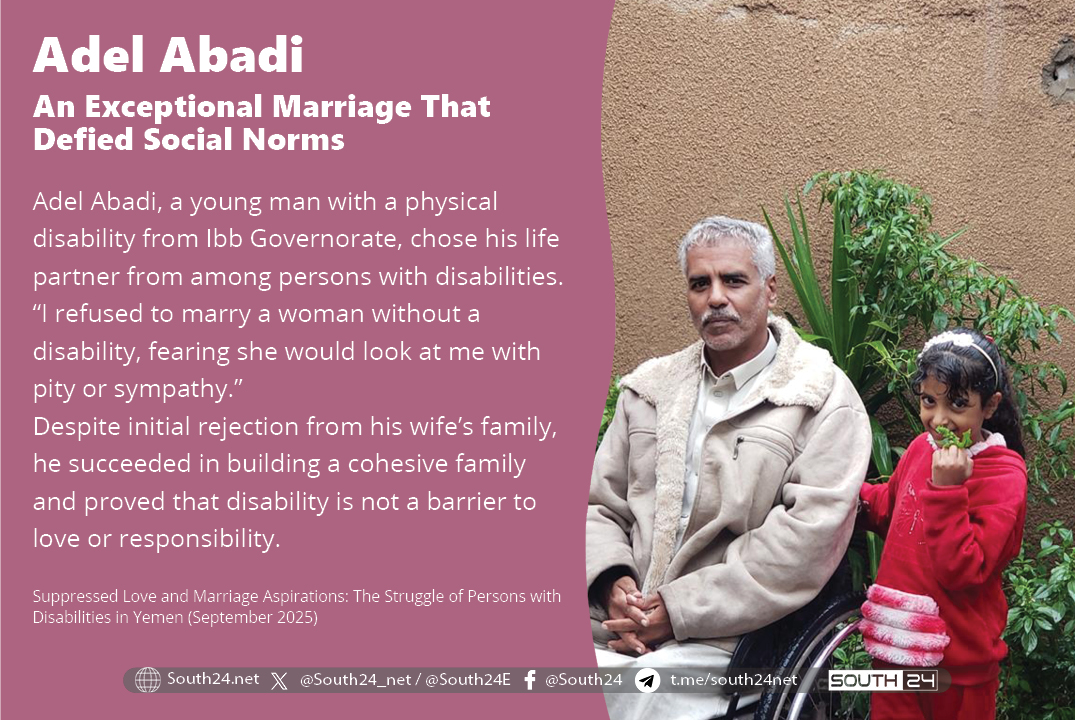
He told South24:
“I refused to marry a woman without a disability out of fear that she would look at me with pity or compassion. I was seeking a psychologically and emotionally balanced relationship.”
But the path was not easy. When he proposed to a woman with a severe disability, he faced rejection from her mother, who believed her daughter was incapable of performing household tasks. Adel recounts:
“I told them confidently: I will do the cooking and household chores.”
After many attempts and mediation by relatives, the family finally agreed. Adel’s family had been supportive from the beginning, with his father telling him:
“This is your life, and you are responsible for it.”
The couple began their life in a modest home. The wife was unable to move due to the excessive pampering she had grown accustomed to. However, with the help of his brothers, Adel began gradually training her until she was able to stand, then walk with a crutch, and eventually walk unaided.
Despite her disability, the wife proved her ability to manage the household and raise their children. She gave birth to several children and was keen to educate them herself. She learned English to assist them in their studies, mastered cooking and sewing, and became a reference point for her family in organizing events. Today, they have a son who has completed high school, a daughter studying pharmacy, and another in elementary school.
Adel concludes his message to society by saying:
“Disability was never the cause of any problem in our life. We build homes, raise children, and work in all fields. A disabled person is not a burden—they are a powerful force and a source of inspiration. Society must change its perception of persons with disabilities and visit their centers to witness their capabilities. The disabled person can be a doctor, an engineer, a teacher… a human being who knows no limits.”
Marriage Between the Blind and Overcoming Societal Perceptions
From the city of Mukalla in Hadramout Governorate, Huda Omar Al-Maqadi—a blind woman holding a Bachelor's degree in Journalism and Media and a professional diploma in Media—shares her experience of marrying a husband who is also blind.
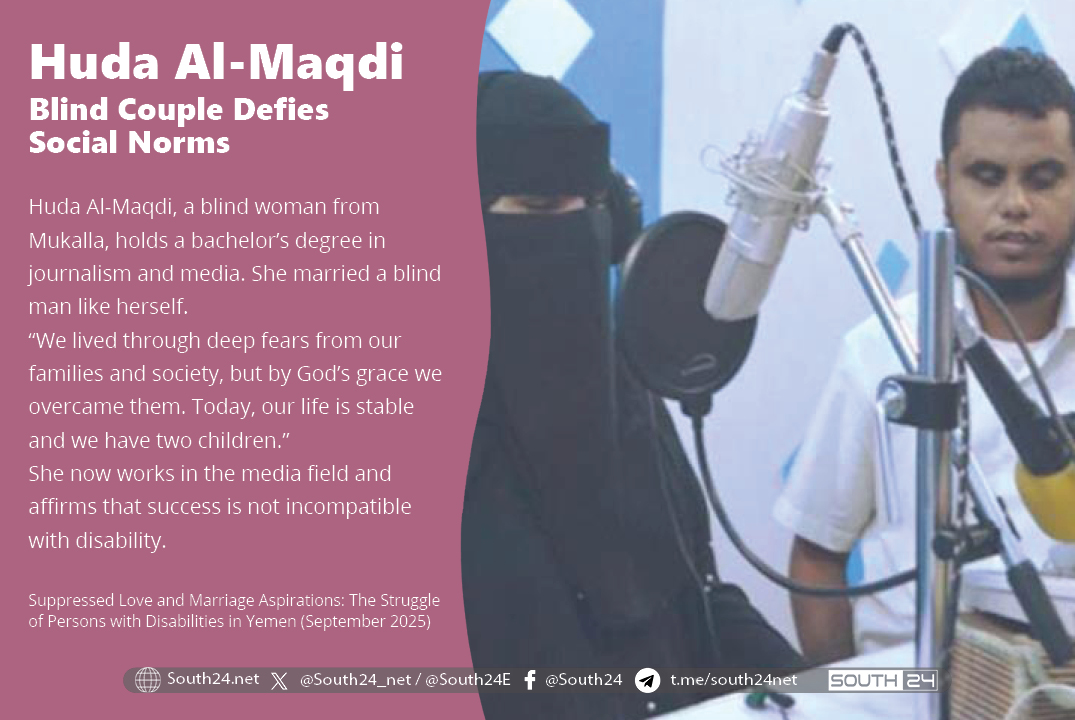
She described the most prominent challenges she faced after marriage as related to issues of independence and privacy. She told South24:
“My husband and I cannot go alone to recreational facilities or healthcare facilities; we always need someone to accompany us.”
Regarding societal acceptance of marriage among persons with disabilities, Huda said:
“The situation is better than before. There is greater acceptance now, but obstacles remain—mainly family fears and the limited perception of our ability to shoulder family responsibilities.”
Reflecting on the early days of her marriage, she recalled:
“We faced a lot of fears from both family and society. Even some close relatives mocked the idea of our marriage and placed obstacles and doubts in our path. But thanks to God, we overcame them and relied on ourselves. Today, our life is stable and we have two children.”
Huda sends a clear message to families: “If you have a son or daughter with a disability who is capable of independence and building a family, be their support and encouragement. Stand by them and empower them to pursue the experience of marriage.”
Today, Huda works as a producer and presenter of radio programs and has completed numerous training courses in the media field. She believes her marital life is an example that success does not conflict with disability.
A Marriage That Faced Rejection and Triumphed Through Love
From Dhamar Governorate, currently residing in the city of Seiyun in Hadramout, Mohammed Saleh Al-Masqari shares with South24 his marital experience with his blind wife, Manal Al-Shawkani. Nine years into their marriage, they have a daughter Taleen, now two and a half years old—making their story a successful model in challenging societal rejection.
Mohammed speaks about his motivations, saying: “My choice of Manal was driven by my admiration for her intelligence, her great ambition, and her outstanding academic achievements. I found that her way of thinking aligned perfectly with mine, and that there was no difference between her and sighted women—in fact, in some aspects, she surpasses them.”
Following their marriage, Mohammed was committed to nurturing Manal’s self-confidence and encouraging her to take on daily responsibilities.
Their journey, however, was far from easy. Mohammed encountered strong opposition from his family—particularly his mother—who initially rejected the idea and actively prevented the marriage. Her eventual approval came only after persistent insistence and repeated appeals.
Manal too faced rejection from several of her brothers and uncles.
Yet the couple’s determination and mutual love ultimately prevailed, and their union stands today as a testament to resilience and shared conviction.
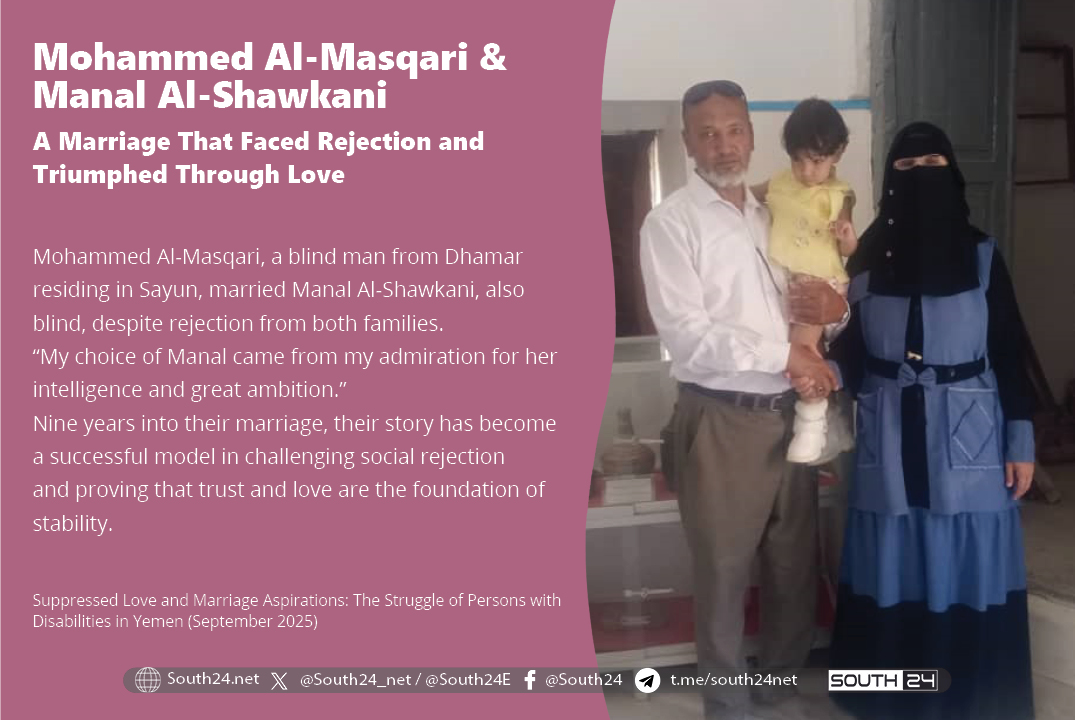
The Voice of Organizations and Civil Society
Although national laws and international conventions guarantee persons with disabilities the right to marry and form a family, social reality still reflects a deep gap between legal texts and practical implementation. This is affirmed by the Women with Disabilities for Development and Peace Group—an independent collective established on February 5, 2023, with the aim of empowering women with disabilities in various aspects of life and decision-making, supported by UN Women.
The group told South24: “Marriage for persons with disabilities is a fundamental human right, guaranteed by national laws and international conventions. However, the real challenge lies in bridging the gap between legal texts and lived reality—through awareness-raising, empowerment, and dismantling the prevailing stereotypes in society.”
Among the most pressing challenges and harmful practices faced by persons with disabilities—particularly women—the group identified three key dimensions:
1. Social Dimension: Pervasive negative perceptions and entrenched societal stigma continue to limit marriage opportunities. Women with disabilities are frequently viewed as incapable of bearing or raising children, reinforcing exclusion and marginalization.
2. Economic Dimension: Limited economic empowerment prevents many individuals from meeting the financial demands of marriage or attaining family independence, further deepening vulnerability and dependence.
3. Negative Practices: Such as exploitation or forced marriage under social or familial pressure, which threatens future family stability.
These experiences affirm that marriage for persons with disabilities in Yemen is not merely a legal entitlement or constitutional clause—it is a vital pathway to psychological and social stability, and a meaningful opportunity to demonstrate responsibility and fulfill family roles on equal footing with other members of society.
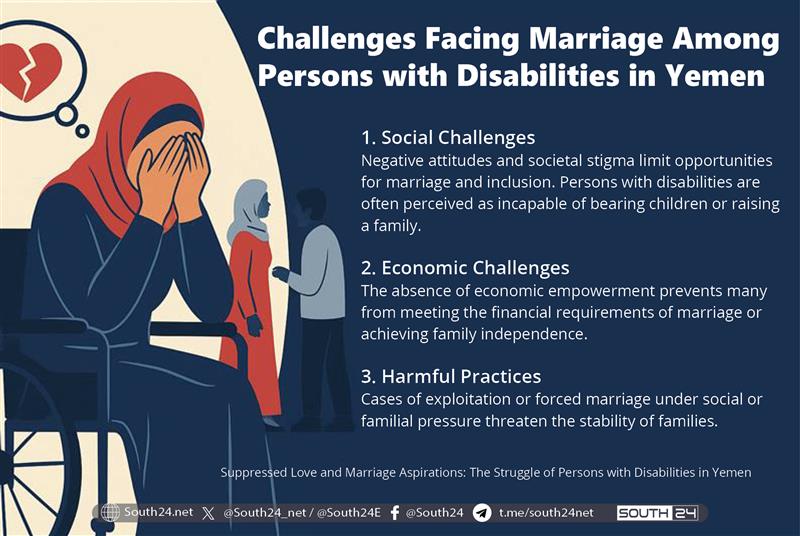
The stories featured in this report have shattered entrenched mental and social barriers. They offer compelling proof that sincere will and mutual love can transform adversity into resilience—and that disability is not the end of life, but rather the beginning of a different journey, equally rich in purpose and achievement.
Yet the path remains obstructed by persistent challenges. Restrictive family perceptions, societal fears, inflated marriage costs, and the absence of institutional support and reliable data – all continue to hinder the full realization of this right in a natural and equitable manner.